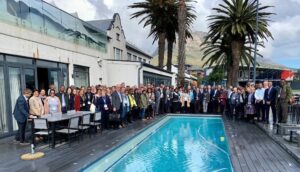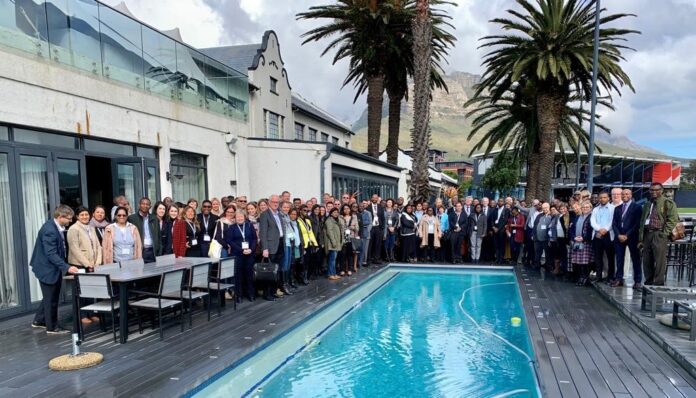As a Ghanaian-American neurosurgeon, I am keenly aware that the care we see as routine and necessary in the United States is currently seen as a luxury in much of the world. Building collaborations to enable capacity-building abroad is the only way we will get there. I was born in Milwaukee, Wisconsin, to two Ghanaian immigrants. They were both born in a fishing village, Elmina, Ghana, to middle-class parents and rose to the highest heights of international business. We moved to Ghana when I was 11, and I lived there for 6 years, going to most of middle school and high school there before returning for college and medical school in the US. After leaving Ghana in 1997, I didn’t spend an extended period of time in Ghana again until 2005, when I spent a month of my 4th year of medical school rotating on the neurosurgery ward of the Ghana’s flagship academic hospital, Korle-Bu Teaching Hospital. There, I met young Ghanaian neurosurgeons and neurosurgeons in training who would become future colleagues.
Flash-forward to 2017, and the Society for Neuro-Oncology and Greg Wilkins-Barrick Chair in Neurosurgery of the University of Toronto advertised the opportunity to host a course in Sub-Saharan Africa (SSA) on neuro-oncology. I jumped at the opportunity to collaborate with my Ghanaian colleagues, and we applied, together. Hosted together with the International Brain Tumour alliance, we met and discussed our various proposals. In meeting with the other applicants, we ultimately decided to discard the idea of a one-off course and, instead, form the Society for Neuro-Oncology in Sub-Saharan Africa. In this way, we hoped to build the workforce dedicated to the treatment of brain tumors in the subcontinent. Our first meeting was held with the Continental Association of African Neurosurgical Societies in 2018, in Abuja, Nigeria, with nearly 100 registrants. Our second meeting was held in 2019, in Cape Town South Africa, with 160 attendees. Notably, in 2018, we were able to fund 33 travel scholarships for trainees from 13 countries in Sub-Saharan Africa. The attendees are pictured, below. Due to the COVID-19 pandemic, we have moved virtual and had over 150 attendees in 2021, even with webinar fatigue setting in. We have also started a monthly webinar educational series with rotating hosts across the continent.
Due to the COVID-19 pandemic, we have moved virtual and had over 150 attendees in 2021, even with webinar fatigue setting in. We have also started a monthly webinar educational series with rotating hosts across the continent.
The reason why I participate in this work is simple – without Ghana, I would not exist. Having lived there and observed neurosurgical care there, I know just how much work we need to do to see progress. The way for me to give back is not to fly back and do 10 cases every few years. Instead, we are building a lasting community that will, one day, provide subspecialized neurosurgical oncology care across the continent.
The published literature indicates that Africa, generally, and SSA specifically, is currently severely under-resourced for neurosurgical care. A recent survey of graduates of the World Federation of Neurological Societies (WFNS) Rabat Training Center course revealed that there were only 102 practicing neurosurgeons in the 12 countries in SSA surveyed, covering a combined population of 267 million people1. Across the continent of Africa, the neurosurgeon to population density is, on average, 0.05 neurosurgeons per 100,000 people, far below the average in industrial nations2. By some estimates, an additional 8,420 neurosurgeons would be needed to satisfy the demands of neurosurgical cases in Africa3. It is clear that there is an urgent need to increase the capacity for neurosurgical care, including subspecialty care, across the globe, and in SSA, specifically.
It is only by partnering with colleagues in places like Ghana that we will, one day, change the future of brain tumor patients around the world. This work will come full circle in 2022, when we will, hopefully, hold the third in-person SNOSSA meeting in Accra, Ghana.
- Karekezi, C., et al., The impact of African-trained neurosurgeons on sub-Saharan Africa. Neurosurg Focus, 2020. 48(3): p. E4.
- Kanmounye, U.S., et al., Emerging Trends in the Neurosurgical Workforce of Low- and Middle-Income Countries: A Cross-Sectional Study. World Neurosurg, 2020. 142: p. e420-e433.
- Dewan, M.C., et al., Global neurosurgery: the current capacity and deficit in the provision of essential neurosurgical care. Executive Summary of the Global Neurosurgery Initiative at the Program in Global Surgery and Social Change. J Neurosurg, 2018: p. 1-10.







